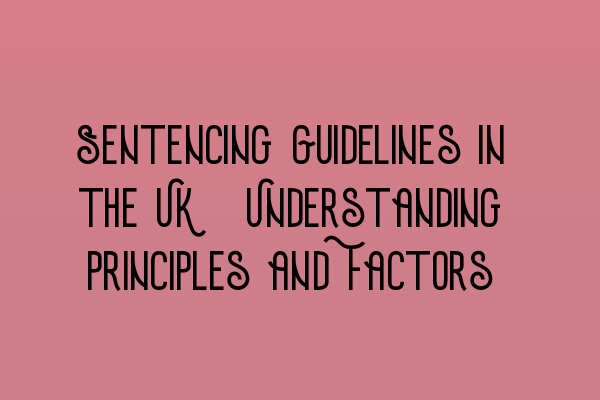Sentencing Guidelines in the UK: Understanding Principles and Factors
When it comes to criminal law in the UK, understanding the principles and factors behind sentencing guidelines is essential. Sentencing guidelines provide a framework for judges and magistrates to determine the appropriate punishment for a criminal offense. These guidelines ensure consistency and transparency in the sentencing process, taking into account various factors that influence the severity of the sentence.
Principles of Sentencing
The principles of sentencing in the UK aim to achieve a fair and just outcome. These principles include the following:
- Punishment: Sentences are intended to punish the offender for their wrongdoing and deter them from further criminal activity.
- Rehabilitation: Rehabilitation aims to reform and reintegrate offenders back into society, addressing the root causes of their criminal behavior.
- Protection: Protecting the public from harm is a paramount consideration, especially in cases involving violent or dangerous offenders.
- Proportionality: The punishment should be proportionate to the seriousness of the offense committed.
- Desert: Sentencing should reflect the level of culpability of the offender, ensuring they receive a sentence that is deserved.
Factors Considered in Sentencing
When determining the appropriate sentence, judges and magistrates take into account various factors related to the offense and the offender. These factors include:
- Aggravating Factors: These factors increase the severity of the offense and may include previous offenses, premeditation, and use of violence.
- Mitigating Factors: These factors lessen the severity of the offense and may include remorse, cooperation with authorities, and lack of previous convictions.
- Victim Impact: The impact of the offense on the victim, both physical and psychological, is taken into consideration when determining the sentence.
- Public Interest: The public interest in the case and the need for public confidence in the criminal justice system are also considered.
Understanding these principles and factors is vital for anyone studying or practicing criminal law. If you are preparing for the SQE (Solicitors Qualifying Examination) in the UK, it is crucial to have a solid grasp of sentencing guidelines and their application in real-world scenarios.
If you are looking for resources to help you prepare for the SQE exams, we offer comprehensive preparation courses that cover all aspects of criminal law and practice. Our SQE 1 Preparation Courses and SQE 2 Preparation Courses are designed to provide you with the knowledge and skills you need to succeed.
In addition, practicing exam questions is an excellent way to reinforce your understanding and test your knowledge. You can access our SQE 1 Practice Exam Questions and SQE 1 Practice Mocks FLK1 FLK2 to enhance your preparation.
Stay up to date with the latest SQE exam dates and important information by checking out our SRA SQE Exam Dates page.
By familiarizing yourself with the principles and factors behind sentencing guidelines, you will be well-equipped to navigate the complexities of criminal law and practice in the UK. Remember, a thorough understanding of sentencing guidelines is not only important for passing exams but also for serving justice and advocating for your clients in real-life legal scenarios.
